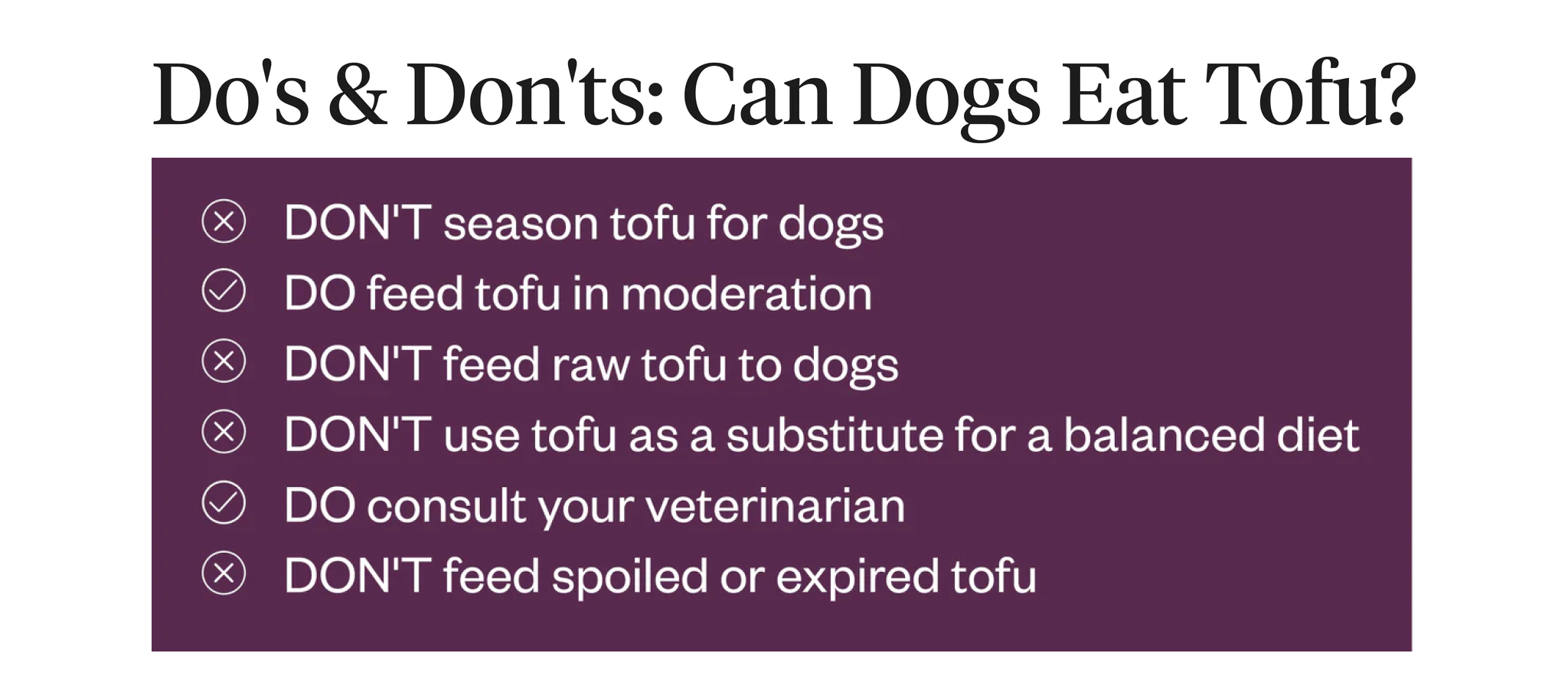9 Min Read
Can Dogs Eat Tofu?
Key takeaway
Dogs can eat tofu in moderation, but it should be plain, cooked, and cut into small pieces. Avoid seasonings, especially garlic and onion. Consult your vet and ensure it aligns with your dog's dietary needs.

Why pet owners are switching to online vet care with Dutch
-
Prescriptions delivered free to you
-
Fast access to Licensed Vets over video
-
Unlimited video visits and follow-ups
If you've ever wondered whether tofu is a safe addition to your dog's diet, the answer is yes, with a few essential caveats. Tofu, a plant-based protein source, can be shared with our canine companions in moderation. It's non-toxic. However, while it contains some nutrients that might be beneficial for dogs, tofu is not a necessary part of their diet. [1]
Your dog's diet should already contain all the essential nutrients they need to live a happy, healthy life. Can dogs eat tofu? Yes, but should they? Keep reading to learn more about feeding your dog tofu.
- Can Dogs Eat Tofu: Do's & Don'ts
- How Much Tofu Can I Give My Dog?
- Serving Tofu Safely
- FAQs
- Final Notes

Can Dogs Eat Tofu: Do's & Don'ts
Can dogs eat cooked tofu? While tofu can be a safe addition to your dog's diet, understanding the do's and don’ts is essential to ensure their well-being. Here are a few considerations for feeding tofu to dogs:
DON'T season tofu for dogs
When offering tofu to your dog, it's crucial to remember that simple is often best. Plain, unseasoned tofu is the way to go. Avoid using seasonings, spices, or any ingredients like garlic and onion . [1] These seasonings can be toxic to dogs and should never be added to their food. While it may seem bland to us, plain tofu can be a delicious and nutritious treat for your dog.
DO feed tofu in moderation
As with any new addition to your dog's diet, moderation is key. [1] Tofu should be considered an occasional treat rather than a dietary staple. While tofu is packed with protein and other beneficial nutrients, it lacks certain essential amino acids that dogs need for a balanced diet.
Tofu doesn't contain enough protein to meet your dogs' daily requirements. [1] Dogs are primarily carnivores, and their diet should be centered around animal-based protein. Tofu can be a useful addition for dogs with dietary restrictions or sensitivities to animal proteins, but it shouldn't replace meat or other protein sources entirely. A high-quality dog food should still be the primary source of nutrients, with tofu serving as a supplementary treat.
An excess of tofu can disrupt the delicate nutritional balance in your dog's diet. So, use it sparingly as an occasional snack or component of their balanced meals. Remember, treats should make up no more than 10% of your dog's daily calorie intake.
DON'T feed raw tofu to dogs
Can dogs eat tofu raw? For dogs, it's generally safer and more digestible to offer cooked tofu rather than raw. [1] Cooking tofu can break down some of the compounds that can affect digestion and eliminate bacterial contamination. Like many plant-based foods, tofu can carry the risk of bacterial contamination, such as E. coli and salmonella. Cooking tofu can help reduce this risk.
The cooking method also matters. Can dogs eat fried tofu? Never feed dogs fried tofu, as excessive oil or seasoning can be harmful to your dog. Gently cooked plain tofu is your best bet.
DON'T use tofu as a substitute for a balanced diet
Tofu can be included as a supplementary treat or component of your dog's meal, but it should not replace a well-balanced dog food. Commercial dog foods are formulated to meet all your dog's nutritional needs, and they should remain the primary source of nutrients in your dog's diet.
DO consult your veterinarian
Before making any significant dietary changes or introducing new foods to your dog, it's good practice to consult your veterinarian. They can provide guidance on how to safely incorporate tofu or other foods into your dog's diet, taking into account any specific health and dietary requirements.
DON'T feed spoiled or expired tofu
Always ensure that the tofu you offer your dog is fresh and not spoiled or expired. Spoiled tofu can cause food poisoning, which is as harmful to dogs as it is to humans.
How Much Tofu Can I Give My Dog?
When it comes to feeding your dog tofu, moderation is essential. Tofu should only be an occasional treat. In general, the amount of tofu you can give your dog depends on their size. Larger dogs can tolerate slightly more tofu, while smaller dogs should receive smaller portions.
Remember, tofu shouldn't be a regular part of your dog's diet. Feeding your dog tofu once or twice a week as a treat is generally safe, but it shouldn't replace their regular dog food.
Additionally, always consult a vet before introducing any new food into your dog's diet. They can provide personalized recommendations based on your dog's specific nutritional needs and any existing health conditions.

Serving Tofu Safely
Can dogs eat tofu? Yes, but serving it to your dog safely is essential to ensure they enjoy it without any side effects or health issues. Here are some key considerations:
- Cut into small pieces: When serving tofu to your dog, cut it into small, bite-sized pieces. This makes it easier for your dog to eat and reduces the risk of choking.
- Monitor your dog: While giving your dog tofu, keep an eye on them during the meal. This allows you to ensure they are chewing and swallowing it properly. If you notice any signs of distress or difficulty in eating, intervene immediately.
- Check for symptoms of allergies: As with any new food, monitor your dog for any signs of allergies or adverse reactions. Allergic symptoms in dogs can include itching, hives, gastrointestinal upset, or changes in behavior. If you observe any of these signs, discontinue feeding tofu and consult your veterinarian.
- Moderation: The key to serving tofu safely is moderation. Tofu should only be an occasional treat in your dog's diet. It should not replace their regular dog food, as it doesn't provide all the essential nutrients they need.
FAQs
What happens if dogs eat tofu?
If a dog consumes tofu in moderation and is not allergic to it, it's generally safe and unlikely to cause significant harm. However, excessive consumption or feeding dogs large amounts of tofu can lead to digestive issues like diarrhea, bloating, or gas due to its high fiber content. Tofu also contains fats, and overindulgence can contribute to weight gain, which may not be suitable for overweight dogs.
Additionally, seasoned or cooked tofu with ingredients like garlic or onions, which are toxic to dogs, should be strictly avoided. These seasonings can lead to more severe health problems.
If your dog has consumed tofu with seasonings, you should contact your veterinarian immediately. It's important to provide them with all the necessary information about the type and quantity of seasoning ingested and any symptoms your dog might be exhibiting. If it's after hours, you can take your dog to the nearest emergency vet for treatment.
Keep in mind that while tofu can be a part of your dog's diet, it should not replace their regular, nutritionally balanced dog food, as it doesn't provide all the nutrients they need for optimal health. Always practice moderation and consult your vet to ensure that tofu or any other new food you introduce into your dog's diet aligns with their specific dietary requirements and overall well-being.
Is tofu good for dogs with kidney disease?
Tofu, in moderation, can be a suitable source of protein for dogs with kidney problems . However, it's crucial to stress that dietary changes for dogs with kidney disease should always be made in consultation with a veterinarian.
Dogs with kidney disease often have specific dietary requirements, and their protein intake should be carefully managed. While tofu can be a good source of plant-based protein, it's essential to ensure it aligns with your dog's individual dietary needs. Your veterinarian can provide tailored nutritional advice and recommendations to support your dog's overall health and well-being, taking into consideration their specific kidney disease stage and any other health conditions.
Can dogs eat tofu with soy sauce?
Dogs should never eat tofu with soy sauce. Soy sauce contains ingredients like garlic and onion, which can be toxic to dogs. These ingredients can lead to adverse health effects, including digestive issues and, in severe cases, more significant problems.
Soy sauce is also high in sodium, which can be harmful to dogs in excessive amounts. Excessive sodium intake can lead to conditions like salt poisoning in dogs, which can cause symptoms like excessive thirst, increased urination, vomiting, diarrhea, and, in severe cases, even serious health issues like seizures or coma.
If you intend to feed your dog tofu, it's best to offer it plain, without any seasonings, sauces, or condiments. This ensures that the tofu is safe and digestible for your furry friend. Always prioritize your dog's health and well-being when considering what human foods to include in their diet, and consult your vet if you have any concerns about specific ingredients or foods.

Final Notes
Tofu can be a safe addition to your dog's diet when served in moderation and with careful consideration. Feeding your dog safely means monitoring their consumption, cutting tofu into small pieces, and being alert to any potential allergic reactions. In general, dogs don't need tofu in their diet, so there's really no reason to share it with them. However, if you choose to throw your dog a piece of plain, cooked protein as a treat, they shouldn't experience any adverse reactions.
Learn more about dog diet and nutrition with Dutch. Try Dutch today to consult a licensed vet and ensure your dog is eating a well-balanced diet.
Share
References
-
Lowrey, Sassafras. "Can Dogs Eat Tofu?" American Kennel Club, 5 Dec. 2022, www.akc.org/expert-advice/nutrition/can-dogs-eat-tofu.



